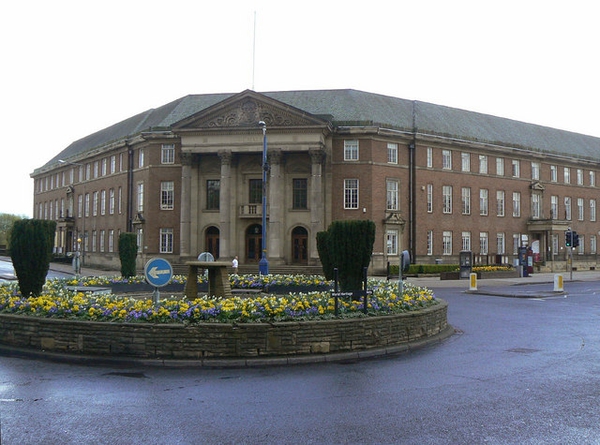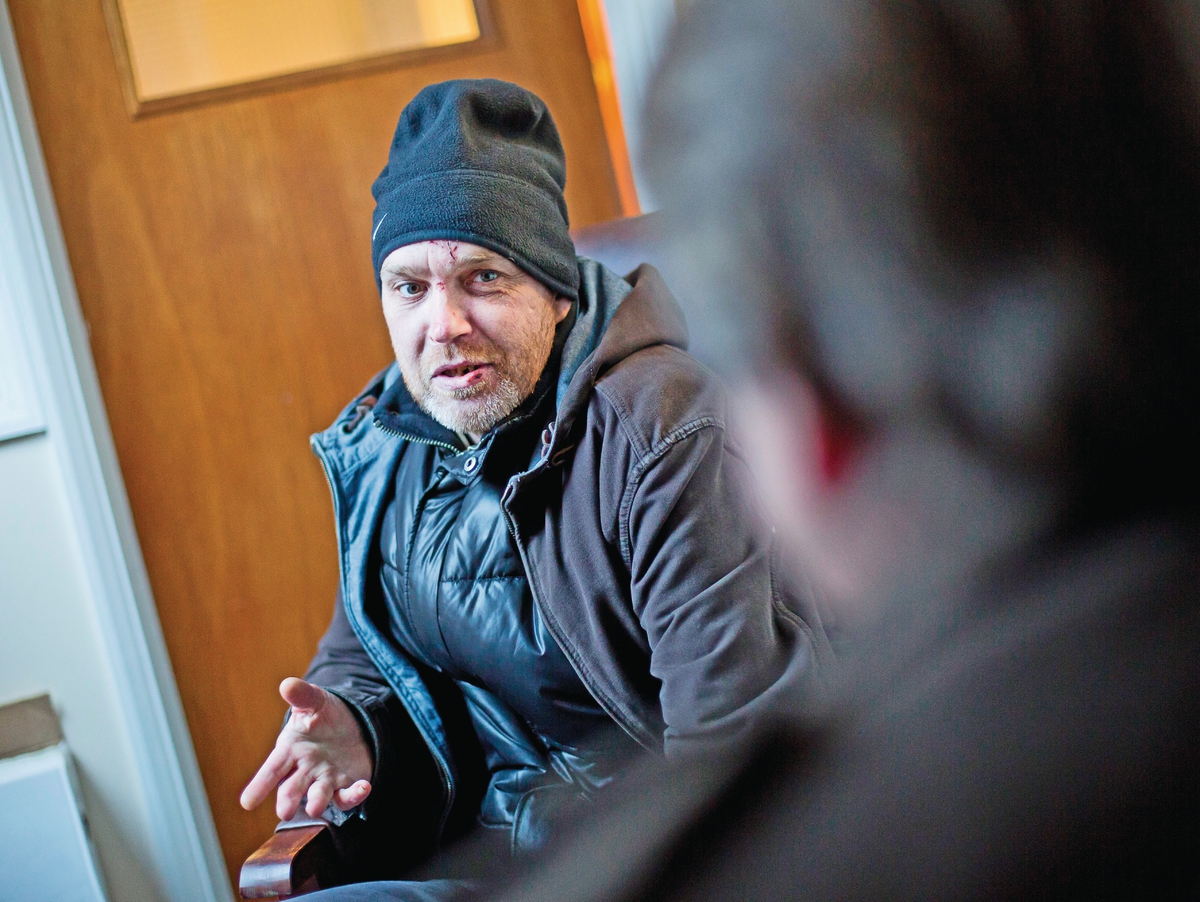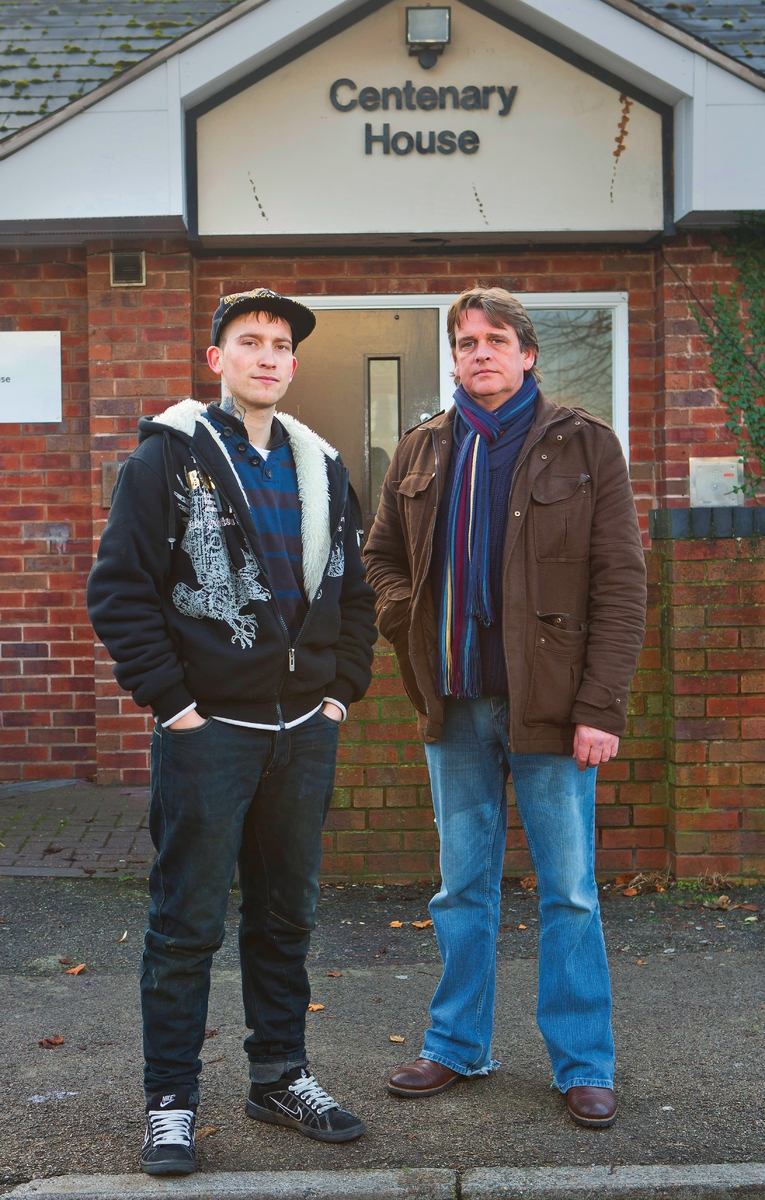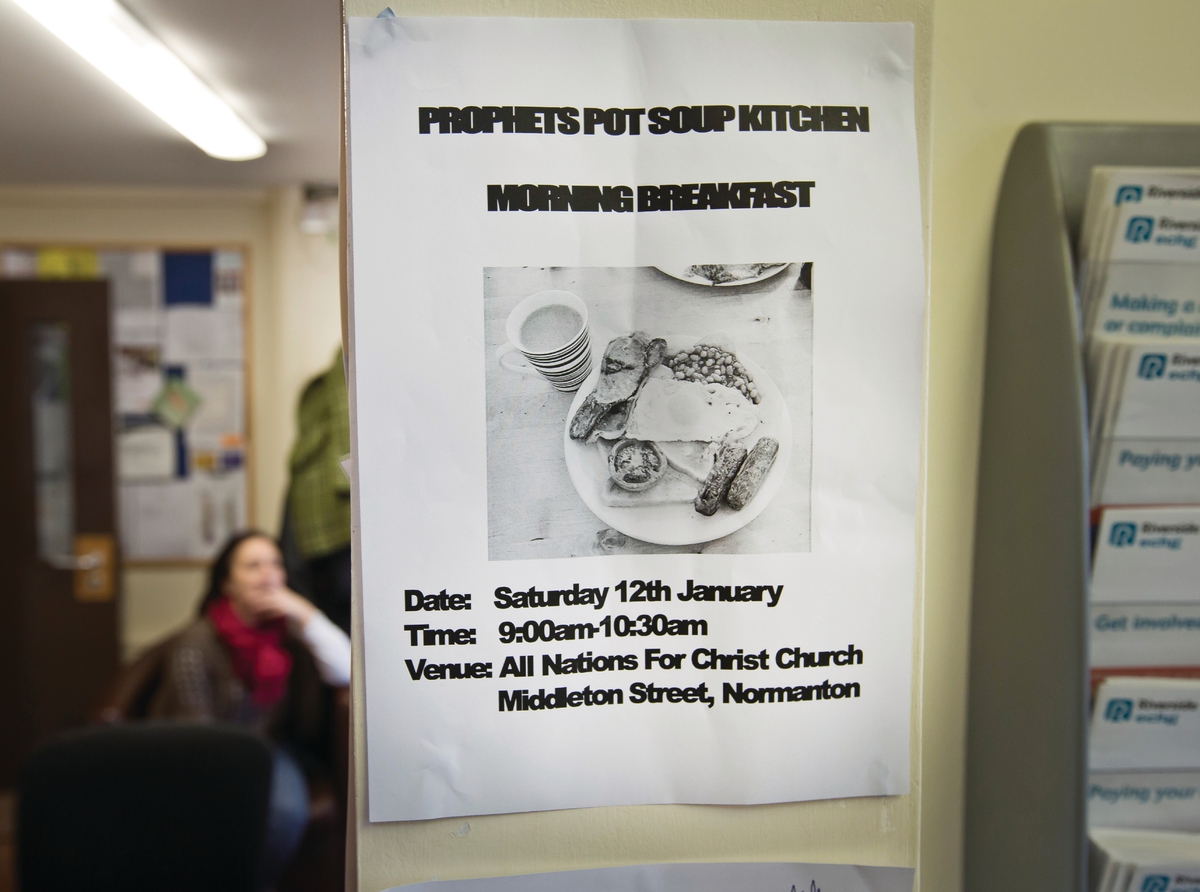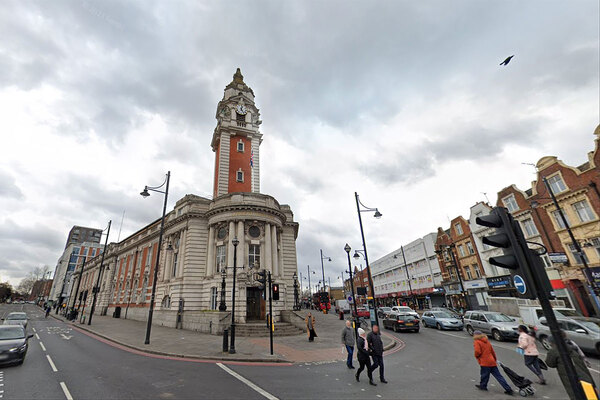Future unknown
Derby Council plans to slash its Supporting People funding by a massive 81 per cent. Emily Twinch travels to the city to investigate what value the council places on supported housing and how the cut will hit providers and service users
‘If it closes I am basically dead. Or back in jail.’ This grave warning is issued by David Lee, a 44-year-old service user of a specialist hostel for homeless people with high support needs in Derby. He candidly describes himself as ‘a proper criminal’ and a ‘prolific offender’.
In and out of prison since he was 16, Mr Lee was an alcoholic, drug user and serial perpetrator of crimes such as armed robbery. He has stopped using drugs, is controlling his drinking and has been out of jail for two years. Mr Lee says he now wants to get a job. ‘Any job will do. I will clean toilets as long as it keeps me out of jail. This place has saved my life.’
He is just one of many clients of Riverside ECHG’s Derby Projects, previously English Churches Housing Group until it merged with Riverside in 2009, that are full of praise for the way it has turned their lives around. Now, though, they are digesting the news that the whole service - which includes the 33-bed hostel and 100 associated beds in other houses for people with medium and low support needs - faces an uncertain future.

Troy Middleton (left) with his Derby Projects support worker, Ian Whittaker
Derby Council plans to slash its Supporting People budget - or housing-related support - from the planned budget of £9.3 million this financial year to £3.8 million in 2013/14 and to £1.8 million in 2014/15. This equates to a savage 81 per cent cut over three years.
Councils across England are also making eye-watering cuts to their SP budget - in part because they are no longer ring-fenced - but Derby’s is by far the largest to date. The government cut the SP budget by 11.5 per cent to £6.5 billion in the 2010 comprehensive spending review.
So, on a grey Wednesday, Inside Housing travels to Derby to find out what the impact of the proposed cut is likely to be. How will service providers survive and what will be happen to their often vulnerable clients? And what value, if any, does the council place on services for the city’s most vulnerable people?
Writing on the wall
Derby Council has already consulted on a cut of 65 per cent to the SP budget and has sent letters to the providers of the 84 services it currently funds informing them that they will be decommissioned on 31 March. On Friday last week, it sent another letter to providers seeking their views on the increased cut of 81 per cent. Providers have until 22 February to have their say, although the council will decide whether to go ahead with the cut at a cabinet meeting on 23 January, a month before consultation closes.
The local authority has stated that the contracts of eight providers will be extended from April until the end of September. Luckily for Derby Projects some of its services have been given this stay of execution, including its hostel for people with high support needs.
Services whose funding is to be stopped altogether on 31 March must reapply for vastly reduced funds in an increasingly competitive environment. For many, this could spell the end.
‘Clients have been asking “where are we going to live after 31 March?”,’ says Reg Smith, midlands area supported housing manager at Riverside ECHG.
Many Riverside ECHG clients Inside Housing speaks to voice similar fears about a future without support services. Paul Wilson, 36, was placed in his own flat by Derby Projects and the ex-offender and recovering drug and alcohol addict is frank about his prospects if support were to be withdrawn.
‘It’s the longest time I have been out of prison since I was 13,’ he says. ‘I have cost millions to the taxpayer over the years. If this place was shut down I would be a mess.’
Troy Middleton, 23, echoes this sentiment. He slept wherever he could and sold drugs since the age of 11, when, he says, his parents were jailed for manslaughter. After 15 months in jail, Derby Projects helped him get a place of his own and start a college course in plumbing.
‘If it had not been for Riverside and ECHG I would have been back in jail by now,’ he says. ‘[The service] changes people’s lives.’
Drastic changes
At YMCA Derbyshire, chief executive Gillian Sewell insists its service for young people will not end. The charity, which has various funding streams and a turnover of just under £3 million, currently receives a little over £600,000 a year from Derby Council’s SP budget but this funding comes to an end on 31 March.
Ms Sewell admits, however, that the service it offers will to have to change dramatically.
‘We will cut our cloth to deliver the services we need to deliver,’ Ms Sewell says. ‘YMCA is not closing. What we are saying is the funding resources we have will direct the level of support and care we can give going forward.’
Service users Brett Burton and Phil Newton, both 18, attended a meeting between councillors and the YMCA the night before Inside Housing’s visit to talk about the cuts. Mr Burton, who spent time on the streets after being kicked out of home at 17 and who now hopes to join the army, made an impassioned plea to Derby councillors. ‘It’s not [just] a hostel, it’s our second chance,’ he told them.

To retain services, the YMCA will have to make deep cuts. Ms Sewell says she currently has a team of 18. She doesn’t know what that will be reduced to, but what remains will be a ‘skeleton’ staff.
Andrew Price, a support worker at YMCA, says: ‘It’s really sad. I’ve spent 10 years building a career which could be whipped out from under my feet.’
Riverside ECHG’s Mr Smith says he will also have cut his staff of 50 currently to around 20 employees if the 81 per cent cut to Derby’s SP funds goes ahead.
Dire consequences
A report from umbrella body Homeless Link, published last Friday, warned that a loss of experienced staff through supporting people cuts is putting ‘crucial relationships’ at risk and leading to poor-quality homelessness services. The organisation also released statistics from its survey of SP service providers which showed communities which had their funding cut reported an increase in rough sleeping by 52 per cent, street drinking by 41 per cent, anti-social behaviour by 48 per cent and crime by 33 per cent.
Derby Council says there are currently 24 rough sleepers on the city’s streets, of which 17 are known to have alcohol misuse issues. Charities working in Derby predict both these figures will soar if the SP cut goes ahead.
Mr Smith says he believes the cuts would lead to many of Derby Projects’ clients returning to life on the streets.
‘I can’t think where they are going to go,’ he says. ‘You could try the private rented sector, but they will not maintain tenancies. Some will be arrested.’
Pat Zadora, chief executive of Padley Group, a small Derby-based charity, warns that if the cuts go ahead it will lose a 10-bed men-only hostel, where almost 30 per cent of the clients over the past 12 months have been schedule 1 offenders, meaning they have committed a sexual offence.
‘These people are the hardest for the city council to place. [We have] people with drug issues, mental health issues, abuse problems, self-harm issues. If we have to close, then all the people we have been dealing with will be on the street and go into crisis.’

Service user David Lee says that without Derby Projects, he would either die or end up in prison
Padley Group also runs the only day centre in the city, which currently has about 60 to 70 people passing through its doors each day. This is not funded through SP, but through a combination of donations, legacies, fundraising and a small voluntary sector grant from the council and NHS, and will stay open. But Ms Zadora fears it will be overrun if other hostels have to close. ‘It’s not that big so it gets full very quickly,’ she explains.
Given charities’ fears for the future of their services and that of their vulnerable clients, how does Derby Council defend its proposed 81 per cent cut to its SP budget?
Under pressure
Fareed Hussain, cabinet member for adults and health, puts it bluntly when asked why the council is planning such a vast SP cut.
‘The council is not required to provide housing-related support services and, while we are aware of the role they play in preventing homelessness, we feel we have limited options available to us in order to achieve a balanced budget,’ he says.
He adds that he recognises there will be an increased demand on its housing department due to the cuts. The team is currently being restructured to meet extra demand, particularly from single people, he states.
‘The restructure would be to focus more resources on housing advice and assistance to facilitate access into more accommodation in the private rented sector,’ he explains.
Mr Hussain adds that Derby Council is facing ‘significant funding reductions’ from central government and must consider savings that will help it protect statutory services that it must provide. The council’s budget from the government is due to be reduced by £62.2 million over the next three financial years.
At least one service sounds like it might be saved. The council proposes to continue running its own 34-bed emergency hostel Milestone House. But, if the service providers and users Inside Housing has spoken to are anything to go by, this is unlikely to off-set the negative consequences of the drastic proposed 81 per cent cut.
The Communities and Local Government department insists that ‘the importance of the Supporting People programme is clear - which is why we’ve protected the funding as much as possible with a £6.5 billion investment, which equates to an annual reduction of less than 1 per cent in cash terms’.
‘This and the funding settlement for councils means they can protect the front line services people rely on, shield the most vulnerable places, safeguard the most vulnerable people and protect taxpayers’ interests.’
Rick Henderson, chief executive of Homeless Link, is also in Derby on the day Inside Housing visits to meet charities and urge the council ‘not to pass on more disproportionate funding cuts to voluntary and community services’.
‘It can be easy to talk in terms of money and statistics but essentially it’s local people who benefit from the work these services do, and it will be them who pay the price if services are forced to close,’ he concludes.
For the likes of Mr Lee - who fears death or jail as a result of reduced support - the price is dear. But, like many councils across the country, Derby’s councillors are calculating that it is one that may have to be paid.
